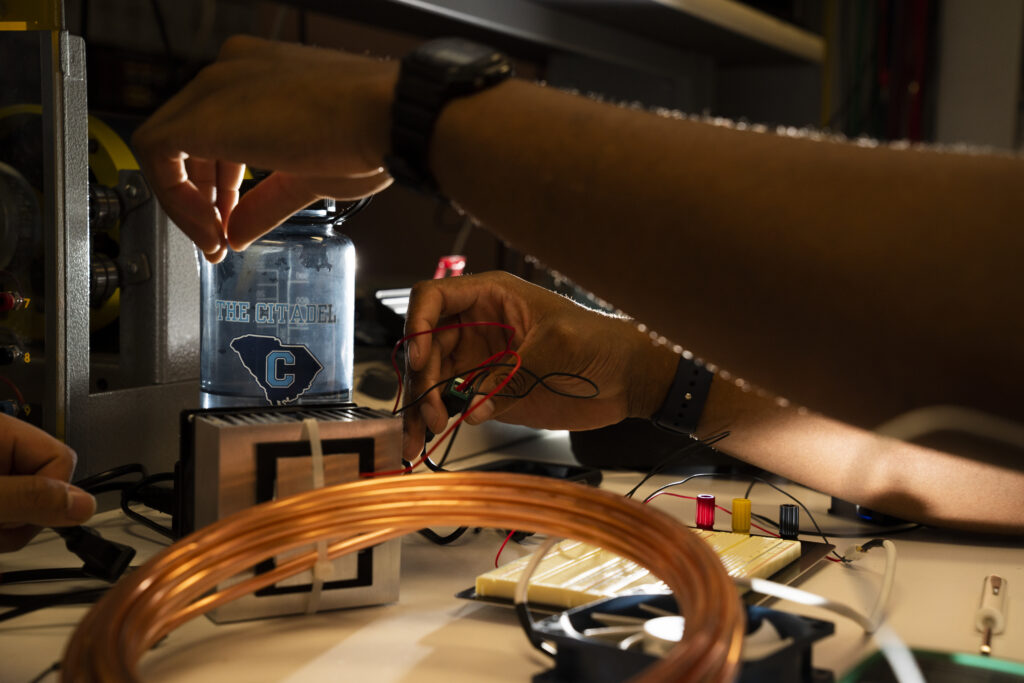Pathway to Your Electrical Engineering Degree
The Citadel offers an undergraduate Bachelor of Science (B.S.) degree in Electrical Engineering (BSEE) through a structured 2+2 Transfer Program. Students begin their studies at South Carolina technical schools or another accredited college or university, completing the first two years of their undergraduate coursework. The final two years of the program, including all upper-level courses, are completed at The Citadel through evening classes.
The program is designed and offered to enable the full-time student to complete the upper two years of the program and receive a BSEE within two academic years and two summers.

Prepare to Transfer to The Citadel
Here’s what you need to know about the course requirements for the Electrical Engineering Transfer Program. This section outlines the courses you will need to complete during your initial studies and the courses required at The Citadel to finalize your degree.
Electrical Engineering Transfer Program Course Requirements
| Degree Requirements | Courses Taken at TTC (with credit hours) |
|---|---|
| English (9 credit hours) | • ENG 101 – English Composition I (3) • ENG 102 – English Composition II (3)2 • ENG 260 – Technical Writing (3) |
| Math (16 credit hours) | • MAT 140 – Analytic Geometry and Calculus I (4) • MAT 141 – Analytic Geometry and Calculus II (4) • MAT 240 – Analytic Geometry and Calculus III (4) • MAT 242 – Differential Equations (4) |
| Science (24 credit hours) | • CHM 110 – College Chemistry I (4) or BIO 101 Biological Science I (4)¹ • CHM 111 – College Chemistry II (4) or BIOL 102 Biological Science II+ lab (4) • PHY 221- University Physics I (4) • PHY 222 – University Physics II (4) |
| History (3 credit hours) | • Any HIS 101 and above (3) |
| Humanities/ Fine Arts (3 credit hours) | • Any English class except public speaking, Foreign Language class 200:499, Fine Arts class, History class3 |
| Social Science (3 credit hours) | • PSY 201- General Psychology (3) or SOC 101 (3) or PSC 201 (3) or ECO 210 or ECO 211 4 |
| Engineering Core | • EGR 269 – Engineering Disciplines and Skills (2)5 • EGR 275 – Introduction to Engineering/Computer Graphics (3) • ECE 221- Introduction to Electrical Engineering I (3) • EGR 202 – Introduction to Engineering Programming (3)5 • EGR 274 – Matlab (3)5 • ECE 222 – Introduction to Electrical Engineering II (3) • ECE 205 – Electrical and Computer Lab I (3) |
2 Any English class 102-499 except public speaking
3 Any English class except public speaking, Foreign Language class 200:499, Fine Arts class, History class
4 Psychology, Sociology, Political Science (American Govt. & similar classes), Economics (Macro/Micro), Anthropology
5 EGR 269 formerly was ECE 201, EGR 202 formerly was EGR 270, EGR 274 formerly was EGR 273
Courses Required at The Citadel
| Courses Taken at The Citadel (with credit hours) Civil Engineering: 61 Credit Hours |
|---|
| • EUGS 101 – Intro to The Citadel (1) |
| • ELEC 311 – Digital Logic and Circuits (3) |
| • MATH 335 – Advanced Engineering Mathematics (3) |
| • ELEC 309 – Signals and Systems (3) |
| • ELEC 306 – Electronics I (3) |
| • ELEC 313 – Junior Lab I (1) |
| • ELEC 312 – Systems I (3) |
| • ELEC 316 – Electromechanical Energy Conversion (3) |
| • ELEC 330 – Digital Systems Engineering (3) |
| • ELEC 302 – Junior Lab II (1) |
| • ELEC 318 – Electromagnetic Fields (3) |
| • CIVL 314 – Engineering Economics (2) |
| • ELEC 421 – Senior Design I (3) |
| • ELEC 412 – Applied Probability and Statistics for Engineers (3) |
| • ELEC 422 – Senior Design II (3) |
| Technical Electives (select 1) |
| • PHYS 308 – Optics • PHYS 410 – Thermodynamics • CIVL 202 – Statics • CIVL 310 – Statics and Mechanics of Materials for Non-Civil Engineers • CSCI 223 – Data Structures • CIVL 411 – Engineering Management • MATH 381 – Deterministic Methods of Operational Research • MATH 470 – Mathematical Models and Applications |
| Approved Departmental Electives (select 5 courses) |
| • ELEC 401- Electronics II • ELEC 403 – Electric Power Systems • ELEC 405/415 – Electrical Measurements • ELEC 407 – Systems II • ELEC 413 – Advanced Topics in Electrical and Computer Engineering • ELEC 414 – System Simulation • ELEC 416 – Communications Engineering • ELEC 418 – Advanced Digital Systems • ELEC 419 – Computer Network Architecture • ELEC 424 – Solid-State Devices • ELEC 425 – Interference Control in Electronics • ELEC 426 – Antennas and Propagation • ELEC 427 – Energy Systems Engineering • ELEC 428 – Computer Architecture • CSCI 420 – Software Engineering |
